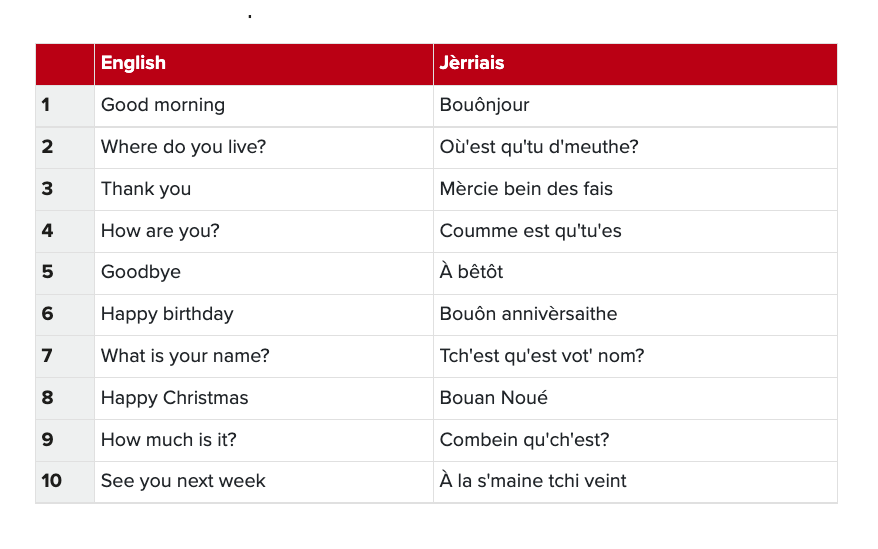In addition to French and English, there are a few under-the-radar indigenous languages spoken in our sailing area. Most people have heard of Breton (Brezhoneg), the ancient Celtic language still spoken—or at least understood—by an estimated 500,000 people, mostly in rural Brittany. And there’s Cornish, spoken in Cornwall, which some people are familiar with. But most people have never even heard of Jèrriais, the traditional Romance language of Jersey. A close cousin of French, there are fewer than 4,000 people who still speak it. But around 15 per cent of the island’s population claim to have some familiarity with it.
Take a look:
Jèrriais fast facts:
it was once Jersey's first language
it proved to be particularly useful during the wartime Occupation; locals could talk without being understood by the Germans
it is still evolving: new words are regularly added to the Jèrriais lexicon, just as new coinages are constantly popping up in contemporary French and English
The baliwick’s government believes it’s important to maintain Jèrriais as a living language. By teaching it to the island’s children, they’re working to make sure it has a future. From their website:
There are very few parents able to teach their children the language, so it's important that it's taught at school. It's common throughout Europe to teach and learn through lesser-used languages.
Before the 1960s there was no Jèrriais education in schools. Now, Jèrriais lessons are offered in all States primary schools and some private schools, too. Children can continue learning in secondary school if they choose.
Jèrriais lessons in primary schools start in year 4; however, because of a shortage of qualified teachers it's not possible to offer lessons in every year at all primary schools. In secondary schools, children will be able to study to the TGJ, the Jèrriais equivalent of GCSE [“The General Certificate of Secondary Education” a set of high-school exams taken in England, Wales, Northern Ireland, and other British territories.]
There are many benefits to teaching Jèrriais to children:
it helps their intellectual development, mental agility and alertness
it makes it easier for them to learn other languages when they are older
it helps them understand their cultural identity as Jersey citizens
it helps them respect people who speak different languages
it introduces them to a rich tradition of prose, poetry and music
To read more about efforts underway to revive Jèrriais, click here.
If you’d like to hear what Jèrriais sounds like, click here. And if you want to practice your own Jèrriais, go to Twitter and type in #ADitonADayKeepsTheVirusAtBay. If a Twitter tab is already open on your browser, click here. There’s even an Office du Jèrriais tp promote the language.
Ah—but here’s our favorite link: “Hark! The Herald Angels Sing” in Jèrriais!
More about Breton and other indigenous languages in future posts.



